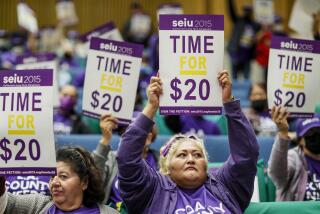Wilson Urged to Exempt More From Food Stamp Cuts
- Share via
SACRAMENTO — In the first concrete challenge to the administration over welfare policy, a bipartisan group of legislators is pushing Gov. Pete Wilson to exempt more counties from food stamp cuts that affect single, unemployed adults.
Led by Assemblywoman Dion Aroner (D-Berkeley) and state Sen. Cathie Wright (R-Simi Valley), the lawmakers contend that thousands of adults in California face the prospect of losing food stamps in the next few months because they cannot find jobs that would allow them to meet the work requirements of a new federal welfare law.
They said a recent Wilson decision to exempt only 26 high unemployment counties from the cutoff requirement did not consider that in many other counties, including Los Angeles, there is a severe shortage of jobs.
At issue is a provision in the federal law signed by President Clinton in August that requires counties to cut from the food stamp rolls all single, able-bodied adults, ages 18 to 50, who do not have children, if they fail to go to work within three months. The three-month time period started running Nov. 22, and state officials estimate that it could affect 124,000 recipients statewide.
“It’s not that anybody disagrees with having people go to work,” said Aroner, who is playing a leading role in welfare as chairwoman of the Human Services Committee. “We are concerned that there are [not] enough jobs.”
Late Friday, the lawmakers began circulating a resolution that urges Wilson to seek a six-month exemption from the federal cutoff requirements for counties and Indian reservations that have insufficient jobs and have not yet established community service work slots for food stamp recipients. Lawmakers are expected to approve the resolution this week.
A spokesman for the governor said that Wilson would be willing to consider the six-month proposal but would not consider expanding the exemptions for any longer period. “He is amenable to studying the issue,” said press secretary Sean Walsh, adding that the governor will not make a decision until he has seen the resolution.
The new federal law allows areas of the state to be exempt from the cutoff provision if unemployment exceeds 10% or if there is a job shortage. It also allows recipients to continue getting food stamps if they are working in a community service or government-subsidized job, commonly called workfare.
Unlike governors in 31 other states, Wilson has followed a narrow interpretation of the law, selecting for exemptions only those counties with unemployment higher than 10%. Under the law, the federal government grants the exemptions, but they must be requested by the governor.
Last week, counties pleaded for a broader interpretation of the law, contending that many of them did not have enough private-sector jobs for food stamp recipients and needed more time to create community service slots.
“Counties are in the position of having to deny food stamps to people who want to work but for whom there are neither jobs nor work slots available,” Margaret Pena, a lobbyist for the California State Assn. of Counties, told a legislative committee.
By granting exemptions for only 26 counties, she said, Wilson also created the potential for many of them to be turned into magnets for needy single adults.
Del Norte County initially refused to accept the waiver, she said, because officials there feared that residents of neighboring Humboldt County, which did not get a waiver, would flood across the border. The county later decided to accept the waiver. Likewise, she said, Glenn County, which qualified for the waiver, has been worried about migration from nearby Butte County, which did not. She said both Humboldt and Butte counties probably would qualify for an exemption if the governor chose to consider the availability of jobs as a factor.
In Southern California, Los Angeles, Riverside, San Bernardino and Ventura counties also are considered by the U.S. Bureau of Labor Statistics to have a shortage of private sector jobs.
In Los Angeles, most single adults on food stamps are on General Relief, a county assistance program that requires recipients to participate in workfare. For 10,000 who are not now in workfare, the county is planning to create work slots but is having difficulty getting them ready in time to meet the needs of the food stamp recipients.
Lawmakers also expressed concern over Indian reservations, particularly those in counties that did not qualify for exemptions. Barbara Risling, a lobbyist for the Hoopa Valley tribe and the Coyote Valley tribe, said there are virtually no job openings on Indian reservations and unemployment runs an average 37%. She said that because reservations are generally located in remote areas, it is virtually impossible for the Native Americans who live on them to work elsewhere.
“We are naturally concerned with what will happen to these people without food assistance,” she said. “Where will they go? There is no food kitchen, no Salvation Army . . . no [government] vocational training . . . no workfare on or even near most reservations.”
More to Read
Get the L.A. Times Politics newsletter
Deeply reported insights into legislation, politics and policy from Sacramento, Washington and beyond. In your inbox three times per week.
You may occasionally receive promotional content from the Los Angeles Times.










